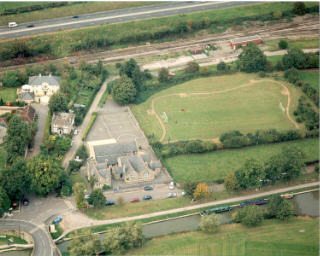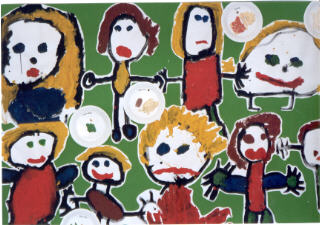The School
History
 |
The School was established on its present site in 1896. In 1989/90 a new two-storey extension was added to the back of the remodelled Victorian School and the School House was refurbished and incorporated into the main school. |
The buildings

|
The Victorian School has a hall, one classroom and a kitchen. The extension has, on the ground floor, one classroom, library, a craft room and two changing rooms, while upstairs are two more classrooms. The School House contains the Head's Office, Secretary's Office, Success Maker Room, Cookery Room, a Staff Room with Work Room and Resource and Stationary Rooms. An Indoor Play Room has been created from what was a covered swimming pool. |
Other Resources

|
The school is provided with books and equipment, which it is always seeking to update and improve. Each classroom has two computers and a specialised schools internet connection. All classes have a TV and video, a CD player and access to other audio visual aids. The school also has a selection of musical instruments, as well as specialised equipment for PE, Games, Science, Art and other subjects. |
The Education
Curriculum
The LEA and Governors' Policy Statements, together with the National Curriculum illustrate the following principles: to provide a broad, relevant and differentiated curriculum; to create entitlement for all; to promote partnership between child, parent, teacher and the community; to ensure continuity and progression; to foster teaching styles which will offer and encourage a variety of relevant learning opportunities; to use the whole school environment with respect so that the quality of the curriculum is enhanced. These principles are applied as follows:
English
|
Each class has a daily Literacy lesson. This starts with the whole class focus on text, which might be fiction, non- fiction or poetry. This is followed by phonic, word or sentence work together. Phonics play a big part in this part of the Literacy lesson in the younger classes.
This whole class section of the hour is followed by independent and related activities including work on the computer, and guided reading. In guided reading the children read and study the same book with the help of an adult.
During the school week all children have time for individual reading, and time is also spent on extended writing, especially with the older children.
The lesson usually finishes with a plenary round-up session. |
|
Mathematics
Each class has a daily Numeracy lesson.
The lesson starts with whole class mental mathematics, followed by an introductory session on the focus for the day that leads into independent or group work related to this. The lesson usually ends with a plenary ‘round-up’ session.
The Mathematics covered during the year will be Number, Shape, Space and Measures and Data Handling, appropriate to the child’s ability.
Investigative mathematics and problem solving are incorporated in all modules of work.
Music
|
All classes have class music lessons which have elements of listening, composing and performing incorporated.
Pitched and unpitched percussion instruments are used and singing skills are taught to enable the children to understand pitch, duration, dynamics, tempo, and timbre. Some modules of lessons on occasions can culminate in a concert performance to which parents are invited. |
 |
Other Curriculum Subjects
There is a two year rolling programme of topics for each class which integrate most curriculum subject - History, Geography, Science, Art & Craft, Music, DT, RE etc. There will be whole class, group and individual activities within this programme. At times some subjects, particularly Science or Art are taught separately. ICT is incorporated across the Curriculum.
We strongly believe in the value of making a range of cultural experiences and opportunities available to pupils. These experiences may be gained through visits from outside speakers and lecturers, visits to places of interest and varied media material.
Art/Craft/Design & Technology
Observational and imaginative drawing, painting, model-making, clay-work and fabric work develop pupils creative awareness. Skills are taught, and visual appreciation encouraged. The resulting artistic efforts are displayed in classrooms and public areas for appreciation by the whole school community.

Religious Education
This is taught from the LEA Agreed Syllabus. It is sometimes part of a topic and sometimes taught as a separate subject. Parents are entitled to withdraw their children and, if so, those children can be accommodated elsewhere in the school. It is linked with personal, social and moral education, where appropriate.
Sex Education
Sex Education is offered to Year 5 and Year 6 children as part of the Health Education Programme and is undertaken by the School Nurse. Parents are informed prior to the sessions so that they can view the video ‘Growing Up’ and talk to the School Nurse before their children see the video. Parents may withdraw their children from these sessions by arrangement if they so wish, but only from those aspects not prescribed in the National Curriculum Science orders. Matters relating to personal development and health are included in the Science Curriculum from reception upwards.
Physical Education
|
The acquisition of physical skills and fitness are important to children’s development. The school has a small hall and the PE equipment ensures that all children can benefit from and enjoy their PE time to the full. The children have regular Games, PE and Movement lessons. |
 |
They also have access to the school playing field and playground where games skills for various sports i.e. netball, football, hockey, athletics, rounders, short tennis, table tennis, basket ball etc. are taught, together with the social skills necessary to participate in sport either individually or as a team. In the summer the field is used for recreational purposes by all pupils. In the winter the older children are allowed access to the field at lunchtimes. A fitness circuit has been installed around the perimeter of the field linked by a jogging track.
Key Stage 2 children have swimming lessons at the Bath Leisure Centre. Classes 1 and 2 attend for a half term each in rotation throughout the year. During the lesson they are instructed in groups according to their swimming ability and work towards a series of graded certificates.
Besides timetabled physical activities’ lessons, there are a number of extra- curricular sports opportunities, which are detailed elsewhere in this Prospectus. Through the Government TOPS Sports Programme for Primary Schools, specialised sports coaches run sessions at times.
Further Information about the Curriculum
On request the following documents can be made available to parents:
- The National Curriculum
- Statutory Instruments
- School schemes of work and syllabuses
- School policies
- OFSTED report of the school
Complaints about the Curriculum
As a County School there is a LEA document setting out the arrangements for any complaints and this may be viewed on request.
Profiles
Details of the child's achievements are contained within each child's profile.
This includes the Teacher Assessment, S.A.T.s (Standard Assessment Tasks) and Non-Statutory Tests as appropriate. With the Profile is a Portfolio of samples of the child's work, some of which will be annotated to link with the National Curriculum.
Our Admissions Policy
OrganisationProspective parents are welcome to come to visit the school. Please ring the office (Tel: 01225 465229) to make an appointment to talk to the Head teacher or see around the school.
Admissions
The school take pupils in the academic year in which they become five, up to the academic year in which they become eleven. The Academic Year is from 1st September – 31st August.
Pupils who start in Reception have at least four weeks part-time before they attend full time. This can be extended if the child is not yet ready for a full day.
The number on roll in September 2001 was 108.
The standard number in each age group is 15. The number of pupils in any one year group may not exceed this except by agreement with the Local Authority and the School Governors.
Pupils are admitted in accordance with the Local Authority Admissions’ Criteria:
- having a brother or sister in the school
- and living nearer the school than any other school
There is an Appeal’s Procedure, should a place not be offered.
PlaygroupThere is a playgroup in Bathampton. A high proportion of children from the playgroup come to Bathampton School and close links are maintained.
Discipline
The school prides itself on good discipline. Children are encouraged to show maturity, take responsibility and to develop good self-discipline. They are encouraged to move in an orderly manner about the school; to be tidy in their appearance, polite and respectful and caring towards others. Every encouragement is given to children to work and play happily together.
The children are put into four school families in which every age group is represented. The families meet for a special assembly each half term, and have opportunities to play together. There is a School Council of elected pupil members who meet to discuss school issues and to suggest improvements.
Physical violence is very rare and is investigated and dealt with by Senior Management who, using their professional judgement, may decide to involve parents.
The school has an anti-bullying policy, which takes occasions of bullying, including verbal or physical abuse, very seriously. Any such behaviour is dealt with firmly using a range of strategies, including helping children to understand the impact of their behaviour.
Special Needs
The School offers special help for children who have particular difficulties with Maths or Language work. The children are assessed and given special support in small groups, or individually, and within the classroom may have differentiated tasks when necessary. Parents are encouraged to help at home with any extra tasks the teacher suggests.
Individual language or numeric support can be given through the computer based ‘Success-Maker’ programme.
Children with unspecified learning or behavioural difficulties, after discussion with parents, can be referred to the Educational Psychologist who will assess and advise parents and teachers on the best help that can be given.
Children with a Statement of Educational Needs are welcome in school where special provision can be organised.
The school building is designed to accommodate pupils with disability having a stair lift and a wheelchair access toilet.
Parents are welcome to see the Special Educational Needs Policy.
Children with exceptional ability have a differentiated curriculum, where appropriate, which may involve them working with a higher age group, or differentiated tasks within their own age group.
|